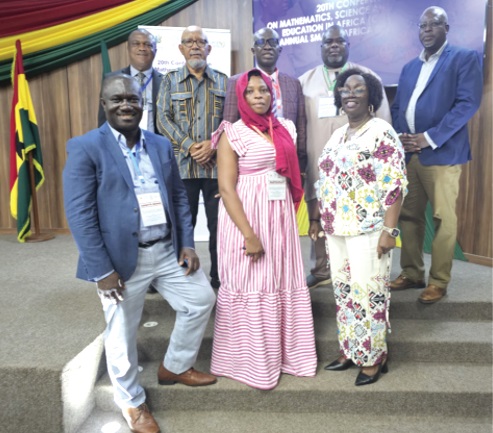
From victimhood into education leadership - Fred McBagonluri speaks on STEAM education
The 20th Conference on Mathematics, Science, and Technology Education in Africa (COMSTEDA-20) and the Annual SMASE-Africa Delegates Meeting took place at the GNAT Hall, Accra, November 28–30, 2023.
The event— organised by the National Teaching Council, Ghana — featured several speakers notably from Zambia, Uganda, Zimbabwe, Kenya and Nigeria, both in person and online.
The Strengthening of Mathematics and Science Education in Africa (SMASE-Africa) is a network of African countries and STEM-based organisations with interest in developing STEM education.
It started in 2001 as an initiative for addressing challenges facing mathematics and science education in African countries and creating synergy in developing STEM education.
Prof. Fred McBagonluri, President of Academic City College, Ghana, served as one of the key speakers, and he discussed “Governance in STEM Education.”
He graduated from Nandom Secondary School in 1990 with distinction, and attended St Augustine’s College, Cape Coast.
He earned a head of state award in 1991 and was a founding Dean of the School of Engineering at Ashesi University.
Prior to his appointment, he was Vice-President of New Product Development at Joerns Healthcare, Arlington, Texas.
He is a recipient of the 2008 US Black Engineer of the Year: Most Promising Scientist Award and was 2009 Finalist of the NASA Astronaut Candidate Corps (ASCAN). He delivered his address as follows:
Prof. Fred McBagonluri
The effective governance of STEM education is essential for shaping the minds of our future leaders, scientists, engineers and innovators.
It serves as the cornerstone for the revolutionary STEM education structure.
Science, Technology, Engineering, and Mathematics (STEM) are not merely buzzwords; they are the pillars that support global and African development.
The recent reaction to the global COVID-19 epidemic provided striking evidence of how STEM could be a potent instrument for promoting growth and strengthening societal resilience.
Technological advances have become vital in driving the fourth industrial revolution, as we navigate a world marked by rapid changes, new challenges, and limitless opportunities.
In order to optimise the benefits of STEM education for Ghana, let’s consider the establishment of an industry-academia-government Advisory Board under the auspices of the Ghana Academy of Arts and Science.
This board will bear the responsibility of monitoring global trends in STEM education, keeping abreast of workforce development statistics across the STEM continuum.
By fostering collaboration between these three key pillars, we can ensure that our educational strategies align with the dynamic needs of both the local and global workforce.
STEAM Directorate
In crafting governance frameworks for STEM education, it is critical to acknowledge the introduction of STEAM Directorate.
This will encompass vital components such as STEM Teacher Certification, ensuring that our educators are equipped with the necessary skills and knowledge to impart STEM education effectively.
Curriculum Development will be a key focus, adapting our educational content to meet the demands of the ever-evolving technological landscape.
The establishment of a STEAM Training College will serve as a hub of continuous professional development for our educators, ensuring that they stay at the forefront of STEM education methodologies.
Moreover, we propose the creation of National and Regional STEM Centres of Excellence, acting as hubs of innovation, research and collaboration.
In fostering governance for STEM education, we must advocate increased Industrial Sponsorship in STEM education.
Industries should actively support Corporate Social Responsibility (CSR) scholarships and sponsorships.
By forging partnerships with private sectors, we can create a sustainable ecosystem where industries actively contribute to the development of STEM education.
This not only aids in nurturing the talents of our future workforce but also strengthens the link between academia and industry.
Equitable access
At the core of STEM education governance is the need to guarantee equitable access to high-quality education, especially in the field of STEM.
The fact that most STEM education and training programmes in Africa are plagued by systemic discrimination and deep-seated inequality presents a significant obstacle.
This includes a lack of resources, insufficient programmes for teacher development, restricted Internet access and inadequate infrastructure for STEM education.
We must strive to establish an environment in which students are active participants in their own learning journeys and not solely passive recipients of information.
As per the findings of UNESCO, considerable advancements have been achieved in the pursuit of universal primary education throughout the continent, as evidenced by average primary school enrolment rates surpassing 80 per cent.
Nonetheless, despite these advancements, there remains a lack of equitable access to high-quality education, specifically in the field of STEM.
Despite the overall enrolment increase, inequalities continue to endure as a significant proportion of children remain absent from school.
It is discouraging to observe that primary schools continue to face barriers to accessing STEM education, despite experiencing higher enrolment rates.
Let us not view STEM education as only a means to achieve academic excellence, but also as a driver of societal transformation.
Through the provision of world-class STEM education, we are not solely nurturing future scientists, engineers and technologists, but also fostering the development of individuals who are adept at problem-solving, critical thinking and conscientious global engagement.
The writer is a trainer of teachers, leadership coach, motivational speaker and quality education advocate.
E-mail: anishaffar@gmail.com

